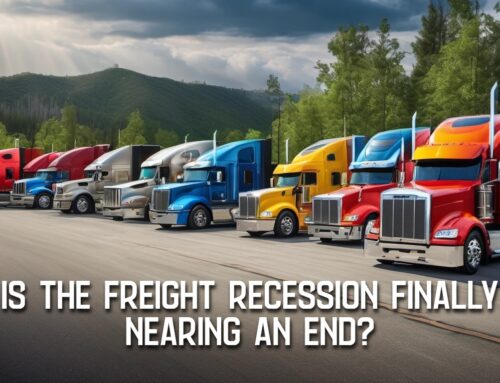Table of Contents
I wish more truckers would pay attention to the Logistics Managers’ Index that’s published monthly and made available to the public, free of charge. The Logistics Managers’ Index or LMI for short, is an index that measures the overall health and performance of the logistics industry in the United States. It is compiled by the Council of Supply Chain Management Professionals (CSCMP) and is based on a survey of logistics managers from various industries. Here’s the link to the January LMI report.
The LMI consists of several key components, including:
- Transportation: This component measures the performance of various transportation modes, such as trucking, rail, air, and ocean freight.
- Inventory: This component reflects the level of inventory held by businesses and the efficiency of inventory management practices.
- Warehousing: This component assesses the utilization and efficiency of warehousing and distribution facilities.
- Pricing: This component tracks changes in logistics costs, including transportation rates, fuel prices, and warehousing fees.
- Technology: This component evaluates the adoption and impact of technology in the logistics industry.
The LMI is a valuable tool for logistics professionals and businesses because it provides insights into:
- Industry Trends: The LMI can help identify emerging trends and patterns in the logistics sector, allowing businesses to make informed decisions and adapt their strategies accordingly.
- Performance Benchmarking: By comparing their performance to the LMI, businesses can assess their efficiency and identify areas for improvement.
- Economic Indicators: The LMI can serve as a leading indicator of economic activity, as changes in logistics activity often precede changes in overall economic conditions.
The Trucking Industry is Coming out of the Freight Recession
 The report suggests that the logistics industry is gradually transitioning out of the freight recession and moving towards a period of growth, although the sustainability of this recovery will depend on various factors, including global economic conditions and the ability of supply and demand to reach equilibrium.
The report suggests that the logistics industry is gradually transitioning out of the freight recession and moving towards a period of growth, although the sustainability of this recovery will depend on various factors, including global economic conditions and the ability of supply and demand to reach equilibrium.
- Overall Expansion: The LMI reading of 55.6 indicates that the logistics industry is experiencing overall expansionary conditions in January 2024, marking the first time since September 2019 that every metric is in expansion territory.
- Transportation Recovery: The transportation component saw a significant increase, with Transportation Prices returning to expansion for the first time since June 2022, driven by retailer inventory rebuilding after the holiday season.
- Inventory Management: Inventory Levels also expanded, reflecting retailers’ efforts to restock after the busy holiday period. However, Inventory Costs rose sharply, indicating the higher costs associated with rapid inventory turnover.
- Steady Warehousing Metrics: Warehousing metrics continued their steady growth, with all three components (Capacity, Utilization, and Prices) showing moderate expansion, albeit at slightly slower rates than in previous months.
- Future Optimism: Respondents expressed optimism about future conditions, predicting an overall LMI of 62.8 in the next 12 months, driven by expectations of increased inventory levels, higher transportation prices, and growing warehousing activity.
- Upstream vs. Downstream Differences: There were some notable differences in expectations between Upstream and Downstream respondents. Upstream firms anticipated higher inventory levels and costs, while Downstream firms aimed for just-in-time inventory management.
- Varied Responses Across Firm Sizes: Larger firms reported more robust growth in inventory and warehousing metrics compared to smaller firms, reflecting the ongoing recovery from the 2023 economic downturn.
- Early vs. Late January Trends: The report observed some fluctuations within the month, with inventory costs and transportation utilization slowing down in the second half of January, potentially due to post-holiday adjustments.
What it Means for Small Trucking Companies
 The January 2024 Logistics Managers’ Index (LMI) report indicates positive developments for the logistics industry, with overall expansion across various metrics. However, small trucking companies may need to navigate specific challenges and opportunities in this evolving landscape:
The January 2024 Logistics Managers’ Index (LMI) report indicates positive developments for the logistics industry, with overall expansion across various metrics. However, small trucking companies may need to navigate specific challenges and opportunities in this evolving landscape:
1. Rising Transportation Prices and Demand:
- The increase in Transportation Prices, driven by retailer inventory rebuilding, could benefit small trucking companies by potentially leading to higher freight rates.
- Increased demand for transportation services may provide more business opportunities for small trucking companies.
2. Adapting to Changing Inventory Management Practices:
- As retailers shift towards just-in-time inventory management, small trucking companies may need to adjust their operations to accommodate smaller, more frequent shipments.
- This could involve investing in technology and developing flexible logistics solutions to meet the changing demands of customers.
3. Competition and Market Positioning:
- Small trucking companies may face increased competition from larger firms with more resources and established networks.
- Differentiation through specialized services, niche markets, or cost-effective solutions can help small trucking companies compete effectively.
4. Embracing Technology and Efficiency:
- Small trucking companies can leverage technology to improve operational efficiency, reduce costs, and enhance customer service.
- This could include adopting telematics, route optimization software, and digital platforms for communication and tracking.
5. Building Strong Partnerships:
- Collaborating with other small trucking companies, freight forwarders, and logistics providers can help small trucking companies access a broader network and expand their business opportunities.
- Strategic partnerships can also lead to cost-sharing, resource pooling, and improved service offerings.
6. Focusing on Customer Service:
- Providing excellent customer service, maintaining reliable schedules, and ensuring timely deliveries can help small trucking companies build a strong reputation and attract loyal customers.
7. Monitoring Market Trends and Economic Conditions:
- Staying informed about industry trends, economic developments, and geopolitical factors can help small trucking companies anticipate changes and adjust their strategies accordingly.
Overall, the improving logistics landscape presents both challenges and opportunities for small trucking companies. By adapting to changing market dynamics, embracing technology, and focusing on customer service, small trucking companies can position themselves for success and growth in 2024 and beyond.
How We Analyze Logistics Trends for Higher Truckload Rates

At AFT Dispatch, we closely monitor industry reports like the Logistics Managers’ Index (LMI) to stay informed about the latest trends and developments in the logistics sector. This information is crucial in helping us make better decisions when dispatching our customers’ loads and maximizing their earning potential. Here’s how we use the LMI and other market data to benefit our customers:
1. Identifying Market Opportunities:
By analyzing LMI data, we can identify areas of growth and increased demand for trucking services. This allows us to match our customers with loads that offer higher rates and better profitability.
2. Adapting to Changing Customer Needs:
As consumer behaviors and inventory management practices evolve, we adjust our dispatching strategies to meet the changing needs of our customers. For example, if we observe a shift towards just-in-time inventory management, we focus on finding more frequent, smaller shipments for our customers.
3. Optimizing Routes and Reducing Costs:
We use market data and industry insights to optimize routes, minimize empty miles, and reduce fuel costs for our customers. By staying informed about market trends, we can make informed decisions that save our customers time and money.
4. Staying Ahead of Industry Challenges:
The LMI and other reports help us anticipate potential challenges in the logistics industry, such as capacity constraints, regulatory changes, or economic downturns. This enables us to develop strategies to mitigate these challenges and protect our customers’ businesses.
5. Providing Valuable Market Insights:
We share our analysis and insights with our customers, helping them make informed decisions about their own operations. This includes providing information on rate trends, market conditions, and strategies for success in the trucking industry.
Grow Your Trucking Business with AFT Dispatch
If you’re a small trucking company owner or an owner-operator looking to increase your earnings and optimize your business, AFT Dispatch can help. With our established truck dispatch service, we take the hassle out of finding loads, negotiating rates, and managing paperwork. Our experienced dispatchers use their knowledge of the industry and access to real-time market data to find the best-paying loads for our customers.
By partnering with AFT Dispatch, you can focus on driving and growing your business while we handle the complexities of load finding and dispatching. Our service can help you save time, reduce costs, and increase your profits.
Are you ready to make more money with AFT Dispatch? Contact us today at (801) 448-6363 or browse our website to learn more about our services and how we can help you succeed in the trucking industry.
I also invite you to browse through our vast free library of educational trucking videos which we publish at least once a week. Subscribe to our YouTube Channel and never miss a single release that has helped thousands of truckers just like you.






[…] January 2024 Logistics Managers’ Index Report Explained […]